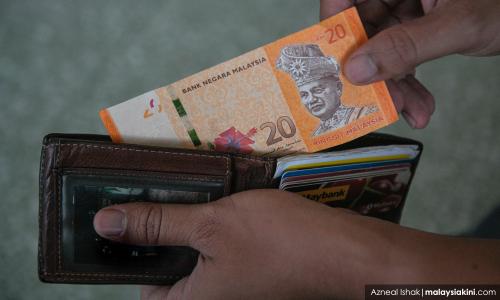LETTER | Are you happy with your salary?
LETTER | Kudos to Human Resources Minister M Saravanan and the government for implementing a minimum wage of RM1,500 effective May 1.
Regardless of how we look at it, RM 1,500 seems to be the right amount, and there should be no room for disputes.
Implementation of minimum wage will soon benefit 27 percent of the workforce. That's 4.2 million workers.
This news is a relief for many struggling Malaysians. However, there are many others who believe that we shouldn't be giving more money to ordinary people.
I don't know if it's still a thing, but when I was younger, there was a popular stereotype that minimum wage jobs were for losers.
"Study hard or you're going to work as a garbage man when you're older!" my mum used to warn.
On the same note, the government too has promised that job opportunities available were first filled by local workers in various employment sectors in the country.
Safeguarding the employment of local workers always tops its agenda.
Based on data, the current monthly minimum wage of RM1,200 or USD$287 is one of the lowest in Southeast Asia.
Thailand has USD$414, whereas Indonesia is USD$326.
If Malaysia wants to be a high-income country within 10 years, reforms are required to successfully join the ranks of other leading and developed economies.
Not a one-size-fits-all solution
The government's decision to prioritise the employment of locals by requiring employers to advertise job vacancies in MYFutureJobs portal before hiring new expatriates or foreign workers is a positive step to resolve unemployment issues, especially for fresh graduates.
MYFutureJobs must play an important role where it should be more interactive, customer-friendly and act as the facilitator in job matching between job seekers and employers.
Employers must try to hire locals, and this should be the way forward.
At the same time, the government is not hasty to bring in foreign workers, including taking into account health safety factors.
When employers raise the wage, they improve the quality of life of workers, which in the long run will raise productivity as workers can spend on education or health products.
Despite this, it was odd for industry players, who cited businesses being bad, yet the demand for foreign workers had already exceeded half a million applications.
So this means Malaysia's economy is doing well.
Nevertheless, raising the minimum wage for the workers now could be "tricky" as it depends on the living cost.
The rise of minimum wage is not a one-size-fits-all solution as it depends on the variable of expenses adopted for the cost of living, such as transportation, rental, mortgage and the price of essential food items.
Well, by improving our minimum wage, ordinary Malaysians gain several benefits, including an improved standard of living and improved productivity.
By increasing wages, you help both the employee and the employer.
The employee can maintain a more comfortable lifestyle, while the employer gets happier, more productive workers and doesn't have to waste money on hiring and training new workers.
It's a win-win situation all around.
The views expressed here are those of the author/contributor and do not necessarily represent the views of Malaysiakini.
RM12.50 / month
- Unlimited access to award-winning journalism
- Comment and share your opinions on all our articles
- Gift interesting stories to your friends
- Tax deductable
